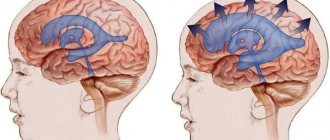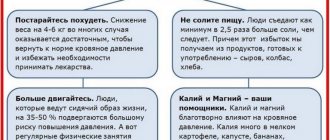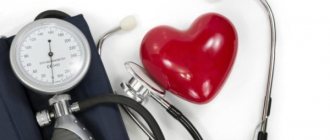Blood pressure is understood as a value that determines the force of blood on the walls of blood vessels. Blood pressure indicators physiologically depend on the intensity of cardiac output (the volume of blood pumped by the heart) and the level of vascular resistance. If these indicators are below normal, then they speak of the development of hypotension. This condition is dangerous to human health and can be caused not only by physiological disorders, but also by psycho-emotional disorders. Therefore, to effectively normalize a person’s condition, low-pressure psychosomatics must be taken into account in the treatment process.
Medical aspect
Blood pressure is an important indicator in assessing a person’s overall health. It is written as a fraction: the upper part is systolic pressure (determines the magnitude of the impact of blood on the walls of blood vessels at the moment the heart contracts), the lower part is diastolic pressure (the pressure at the moment the heart muscle relaxes).
Normally, in an absolutely healthy person, this figure is 120/80 mmHg. Art. The lower limit is 110/70. If the tonometer shows values less than 100/60, then the patient is diagnosed with hypotension. However, for some people this condition is considered normal, especially in women of thin build. Hypotension does not cause them discomfort and does not affect their well-being in any way. But if this condition is not an individual characteristic, then it can bring significant negative consequences.
With a sharp decrease in blood pressure, a person may experience the following symptoms:
- blurred vision;
- cardiopalmus;
- dyspnea;
- nausea and vomiting;
- drowsiness;
- dizziness;
- fainting;
- weakness.
It is loss of consciousness that is the most dangerous symptom, as it leads to accidents and injuries. Therefore, if a decrease in blood pressure is accompanied by fainting, you should urgently consult a cardiologist for consultation. In addition, hypotension can lead to poor blood flow to the brain and increases the risk of stroke.
How to diagnose?
First you need to understand how dangerous your condition is. Diagnosis of hypertension begins with measuring blood pressure.
Mild degree
In mild cases, the pressure does not rise above 159/99. In this case, timely contact with a cardiologist and psychotherapist gives a chance for a complete recovery.
Of course, this will require changing your lifestyle, your way of interacting with others, and establishing a comfortable regime of work and rest.
But, you see, for the sake of your own health, you can go beyond such feats.
Average degree
The situation is worse with pressure readings above 160/109.
With such high blood pressure, hypertension can occur with the threat of damage to internal organs.
Therefore, if you find such indicators in yourself, psychotherapy and lifestyle changes alone will not improve the situation.
This condition is aggravated by other symptoms:
- tachycardia,
- heartache
- headache,
- swelling,
- nausea,
- heaviness in the legs,
- dizziness,
- diarrhea.
Severe degree
This degree occurs after pressure readings of 180/110 and above.
In this case, it is necessary to urgently consult a doctor. It is best to call an ambulance.
This condition can cause myocardial infarction, arrhythmia, heart failure, angina pectoris, and hypertensive crisis.
Common causes of hypotension
Psychosomatics of low blood pressure plays an important role in examining the condition. First of all, the doctor must analyze the physiological causes. They can be represented by the following situations:
- Sudden change in body position. If you squat for a long time or on a low chair and quickly stand up, a healthy person may not feel the symptoms of hypotension for long. This is due to the fact that when a person assumes a vertical position, under the influence of gravity, blood flows sharply to the lower extremities. In order to normalize the level of pressure, the autonomic nervous system gives the command to increase the heartbeat and constricts blood vessels. A healthy person may not feel any changes at all, since these mechanisms work very quickly. But if the autonomic system fails, the brain begins to experience oxygen starvation, resulting in symptoms of hypotension. If a person feels them every time he changes position, and they are quite intense (they don’t go away for a long time and can cause fainting), this is a reason to consult a doctor.
- Eating. After eating, blood begins to flow abundantly into the gastrointestinal tract, and so that the pressure does not drop too much, the autonomic system constricts the blood vessels and gives the command to increase the heart rate. If the body is susceptible to hypotension, then the person will feel the symptoms of this condition every time after eating.
- The child has grown up too quickly. Due to rapid growth, especially in adolescence, the autonomic system begins to fail. This is an age-related phenomenon, and it is called nerve-mediated hypotension. It usually goes away with age, but if it is severe, it requires medical supervision. In addition, adolescents often experience low-pressure psychosomatics, since the puberty period is characterized by frequent mood swings, low resistance to stress and increased emotional tension.
- Disease. Hypotension can be caused by diseases such as diabetes or arrhythmia, shock, disorders of the cardiovascular system, and even the flu.
- Taking medications. Low blood pressure is a side reaction of the body to the use of certain medications.
What are the first “bells” that psychosomatic hypertension will arise in the future?
Future hypertension does not immediately manifest itself as increased blood pressure.
Its appearance is preceded by many “bells” that not everyone pays attention to.
I'll tell you a little more about them.
Fatigue, chronic fatigue
Everything that recently brought joy, brought healthy excitement, and made the blood flow, is now perceived as an additional burden for the exhausted psyche.
A person begins to have difficulty fulfilling his work responsibilities, refuses active forms of leisure, and prefers to “eat up” stress with food or “wash it down” with alcoholic beverages.
Sleep quality disorders
It all starts with slight difficulties falling asleep and, if a person does nothing, ends with insomnia. Sometimes sleep disturbances, even before the development of hypertension, manifest themselves in the form of restless, disturbed sleep, unpleasant dreams, and nightmares.
Often, not yet knowing about problems with blood pressure, a person sees a chase in a dream, feels short of breath, and pressure from the outside.
One of my clients often had dreams where he was covered with grain. Either he is at the depths of the barn, then in the back of a truck, or in a freshly dug hole. He looks up and grain falls on him. It covers his body so much that he can no longer breathe.
Most often, during the stage of lack of breathing, he woke up in a sweat with a strong heartbeat. This dream actually signaled to the dreamer about health problems long before serious symptoms appeared.
I advised this man to undergo a medical examination. And thanks to the fact that we combined drug treatment prescribed by a cardiologist and psychotherapeutic work, the result was simply magnificent.
I would like to note that working with dreams is, in some way, my know-how in psychotherapy. Being a body therapist and working with multiple manifestations of stress in a person, I noticed that the most delicate, one might say, jewelry work is carried out precisely through dreams.
My method is not a continuation of Jungian dream analysis. Rather, it has eastern roots and aims to “reconcile the irreconcilable,” and in fact accept the fact that “body and soul are inseparable,” that “by influencing the body, we heal the soul,” “by influencing the soul, we heal the body.” Dreaming in this context is the subtlest tool for healing the soul.
You can learn more about my method of dream analysis by completing my online training or reading my book. I am sure this will open up new dimensions of self-knowledge for you. I think you will find an incredible amount of discoveries and revelations about yourself.
Decreased performance, deterioration of cognitive abilities
Another sign of poor functioning of the heart and blood vessels.
Even before the appearance of headache that accompanies hypertension, its predecessors are
- deterioration of attention, memory,
- rigidity of thinking,
- inability to be creative.
During the working day, a person feels apathy, lethargy, and sometimes drowsiness.
At the same time, he may be visited by a feeling of indifference to the world around him and a feeling of general hopelessness.
Paranoid signs
A completely normal, adequate person can suddenly become suspicious, overly hot-tempered, overly touchy.
He may perceive the calm, even attitude of others as unkind towards his personality.
Suggestibility
A person can become too suggestible.
He begins to invent problems from scratch, and then experiences them for a long time and painfully in his own head.
Standard psychosomatics of hypotension
Free webinar
Psychomatics: how emotions trigger illnesses
Teacher: Olga Butakova
More details
Psychosomatic low blood pressure is most often observed in young and emotionally sensitive women. They are characterized by constant “surprise” at the rudeness, violence and aggression with which the modern world is filled. In moments of depressed mood, they stop noticing the good around them and see only evil, they feel trapped and at the mercy of a “cruel, unfriendly and unfair life.” It is during this period that, in addition to apathy and hopelessness, low-pressure psychosomatics appears.
In most cases, such people feel lonely, helpless, “alone in confrontation with the evil of the whole world.” They do not see options for a positive outcome of events, even if the solution lies on the surface.
According to Louise Hay's theory, the psychosomatics of hypotension lies in the lack of love that the child did not receive in childhood, in frequent defeatism and a feeling of one's own uselessness and weakness. These experiences can plunge a person into deep depression, as a result of which he does not believe in the success of any endeavors and does not see the point in active actions.
Psychologists note that a typical portrait of a hypotensive person includes self-doubt, lack of determination, inability or unwillingness to take responsibility even for one’s own life. It is easier for such people to blame other people, circumstances, the state, etc., for their troubles, but not themselves. Often hypotensive people believe in omens and are very superstitious. This becomes a kind of support for them and partially justifies their own uncertainty and indecision. Hypotonic people rarely manage to form a family, since they often shy away from the responsibilities inherent in family life. They also often have decreased libido, and they avoid intimate relationships in every possible way.
The psychosomatics of low blood pressure are especially pronounced after attacks of hysteria, which hypotensive people can consciously or unconsciously manipulate others with. After a scandal, a loss of strength immediately sets in, and the person may begin to cry or fall into an emotional stupor.
Work on yourself every day
Louise Hay suggests doing several exercises every day.
This will help raise self-esteem, relax the tense nervous system of the body, look at things differently, and distance yourself from everyday problems and the reasons that caused them. The implementation technology is simple, which allows you to use them not only at home, but also during a few free minutes at work. You can even practice them while commuting to or from work. Regular exercise will also help normalize high or low blood pressure to normal levels. This happens due to the harmonization of the inner world using psychosomatic methods. But such work on oneself should be carried out regularly, both with hypotension and hypertension. “Liberation” - this exercise is designed to free you from fear and obsessive states. To perform it, you need to breathe deeply. At the same time, you will need to repeat to yourself the following phrase: “I am in complete harmony with myself, I do not feel fear.”
"Getting rid of the past." With this exercise you can get rid of negative experiences in the past. You need to learn to look at even the most negative moments from the right angle and give everything a positive spin.
Treatment
After the cardiologist or phlebologist prescribes treatment for the physiological manifestations of hypotension, it is necessary to begin behavioral adjustments of the patient. Psychosomatics of hypotension requires consultation with a psychologist or psychotherapist who will help improve the emotional state. Psychological assistance will be effective only when the patient is committed to voluntary treatment.
Among the most popular methods for improving conditions with low blood pressure are:
- business planning;
- compiling a list of your responsibilities at home or at work (it is advisable to write it down on electronic or paper media and carry it out without delay);
- creating a favorable psychological atmosphere in the family, where respect and trusting relationships prevail (you can contact a family psychoanalyst for help);
- set goals for yourself (first small, and then large), describe them step by step and achieve them;
- do not give up when defeated, gather strength and return to the goal again;
- do not drown in fatigue, get distracted and switch to other things (wash the dishes, sort out your shoes, go to the store, etc.);
- use statements with positive reinforcement: “Everything is fine,” “I can do this,” “I live in harmony with myself,” “My life is full of happiness.”
Tips and tricks from L. Hay
Louise Hay is a pioneer and one of the founders of solving emotional difficulties and problems using psychological self-help methods, which are used to eliminate a specific type of disease. For example, as in this case - to eradicate hypotension or hypertension. But in her opinion, she will not be able to heal completely on her own. In any case, at the initial stage you will need a psychotherapist. It will help to raise the entire layer of layered difficulties and determine how many there are and what exactly influenced the occurrence of a particular disease in the body.
Speaking about independence, Hay meant mostly preventive work to prevent the occurrence of hypotension, hypertension or other diseases. To do this, she recommends using mental hygiene and psychoprophylaxis.
Mental hygiene covers the following areas:
- Family.
- Sex life.
- Work.
- Rest.
- Upbringing and education.
Everything related to preventive influences on oneself personally is designed to improve and influence such basic needs of the body and soul of every person, such as:
- Care and guardianship.
- Love and relationships.
- Respect for yourself and your environment.
- Feeling of happiness.
- Freedom of self-expression through creativity.
- Breadth of thinking.
- Having memories that give optimism, faith and happiness.
Additional Tips
The author of the technique also suggests following a number of recommendations. Following them must be conscious and regular. Gradually, all these tips should be made into a habit, akin to work and will reduce the manifestation of hypotension and hypertension.
- Every morning, when you wake up, thank the world for everything, for the opportunity to breathe, walk, love, create, enjoy life.
- Do only what brings you pleasure. If work is a burden, then every effort must be made to change the situation for the better. Work should be enjoyable, otherwise it becomes a constant irritant. The result is poor health.
- The environment, that is, all close people and friends, should become a source of joy. If communication with a person causes psychological discomfort, then you need to get rid of it - avoid such contacts, or reduce them to a minimum if possible. As a last resort, do not take the results of communication to heart.
- Availability of weekends and vacations.
- Full sleep.
- Contact a psychotherapist for advice and help.
- Write a list of all your personal wishes.
What situations cause hypertension (if it has psychological causes)
For women, as a rule, this is communication with their husband. Anger at him and resentment.
First, an expectation arises, “how a husband should act,” then a reaction to the fact that he acts in his own way. This causes rejection and anger. Sometimes your irritation is suppressed, but negative emotions continue.
The girl thinks about a situation that haunts her, and at this time her body experiences the influence of her psychological state. From a biological point of view, it consists of metabolic processes that are activated at the moment of tension. But the voltage is constant, and it does not discharge.
So anger also causes resentment.
This takes some time to form. But once everything is set in stone, communication becomes very difficult. Spouses begin to communicate through reactions that turn on unconsciously.
From the outside it may seem that the cause of a woman’s hypertension is her husband, who does not give her peace. But, in fact, these are her own internal states, her expectations, anger, resentment, suppression and inability to work on herself.
Sometimes children can also be a trigger.
A mother raising several children at a time can become impatient. In such cases, irritability manifests itself, for example, in response to a child’s slowness (if the child is in no hurry to get dressed), or makes a mess.
And “everything must be perfect.” This provokes tension. However, in another case, another mother will not have such a reaction. She will just look at it all calmly.










